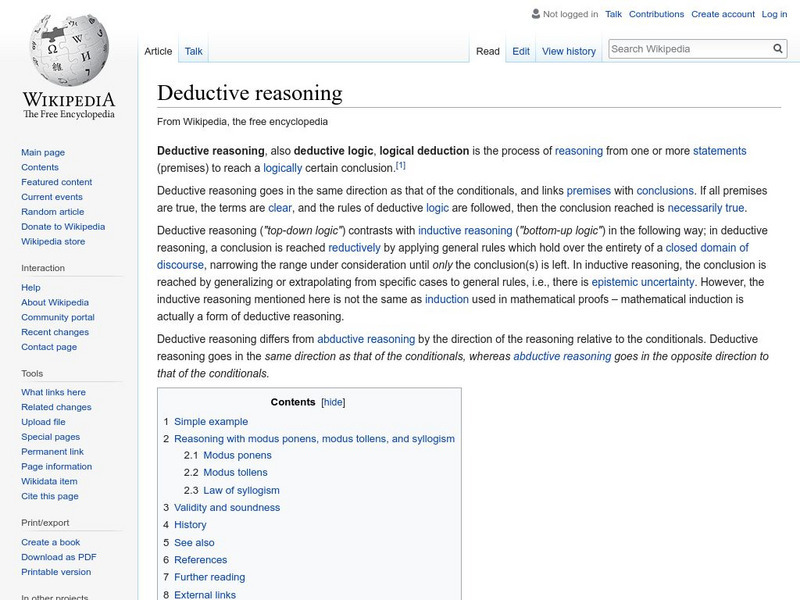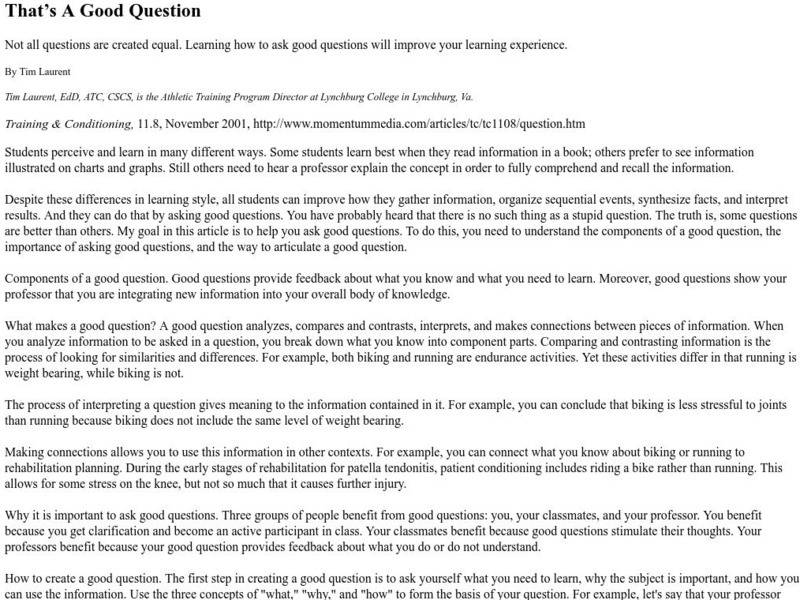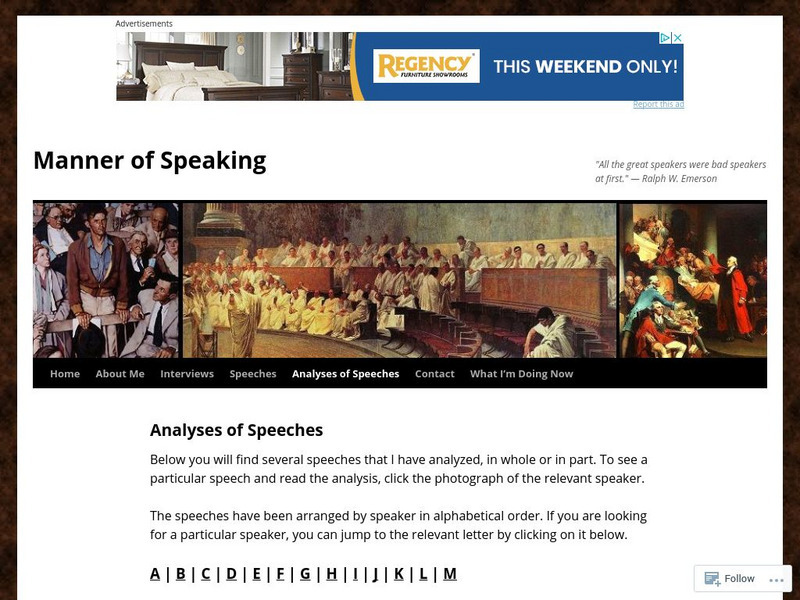Hi, what do you want to do?
Sophia Learning
Sophia: Argumentative Essays
This tutorial focuses on argumentative essays, longer writings on a well-researched topic with the writer arguing one side of the topic, free of fallacies, and providing several claims. A short YouTube clip of Monty Python shows the...
CPALMS
Cpalms: Lafs.8.sl.1.3
Choose from among lesson plans, assessments, and original student tutorials to teach how to analyze a speaker's arguments.
BBC
Bbc Skillswise: Types of Listening
As part of the BBC's Skillswise unit on listening, this site focuses on the various types of listening. As learning tools, the site includes a factsheet, a worksheet, a quiz, and a game.
Thinkport Education
Thinkport: Writing Explanation Part 1: Claims, Evidence and Reasoning
In this module, students will explore how claims, evidence and reasoning are used to write an effective explanation. Students will read an article that addresses the question, "Should Congress consider comprehensive climate change laws?"
Thinkport Education
Thinkport: Writing Explanation Part 3: Building an Argument
In this module, students will explore how claims, counterclaims, evidence and reasoning are used to write an effective argument. Students will read texts that discuss the climate change debate.
Thinkport Education
Thinkport: Writing Explanation Part 1: Claims, Evidence and Reasoning
In this module, students will explore how claims, evidence and reasoning are used to write an effective explanation. Students will read an article that addresses the question of whether climate change is now confirmed after record high...
FNO Press
Fno.org: Inspired Investigations
An article at From Now On about how to help students do better research by changing the focus of research assignments and teaching students to ask essential questions. Some suggestions include using mind mapping, and using Inspiration to...
University of California
University of Cal: Critical Thinking in an Online World
This article discusses why and how to encourage the development of critical thinking skills for students conducting research on the Web. The author even presents an overview of a project that you could adapt to your class.
Wikimedia
Wikipedia: Deductive Reasoning
This free encyclopedia site from Wikipedia gives a definition and examples of deductive reasoning. It also has links to related terms and topics.
Lumen Learning
Lumen: Boundless Communications: Credibility Appeals
In this Boundless Communication, students will learn about the importance of credibility in public speaking. There are four sections: defining credibility, types and elements of credibility, building credibility, and ethical usage....
TED Talks
Ted: Ted Ed: How Miscommunication Happens (And How to Avoid It)
Katherine Hampsten describes why miscommunication occurs so frequently, and how we can minimize frustration while expressing ourselves better. [4:32]
Polk Brothers Foundation Center for Urban Education at DePaul University
Depaul University: Center for Urban Education: Improve an Argument [Pdf]
This resource provides a downloadable worksheet. Students will read a nonfiction article and then answer scaffolded questions that will help them determine the strength of evidence presented in the argument. Then students will provide...
Polk Brothers Foundation Center for Urban Education at DePaul University
Depaul University: Center for Urban Education: Contrast Points of View [Pdf]
A graphic organizer is provided for students to use as they analyze arguments. Students will find a guiding question to answer after they complete this graphic organizer.
Polk Brothers Foundation Center for Urban Education at DePaul University
De Paul University: Center for Urban Education: Can Contrast and Evaluate Fact, Opinion [Pdf]
This site provides a poster that will guide students as they contrast and evaluate facts and opinions. Guiding questions and student prompts are provided.
Web Center for Social Research Methods
Research Methods Knowledge Base: Deduction and Induction
This site provides a good explanation of deductive and inductive thinking.
Harvard University
Harvard University: Games With Words: The Communication Game
A study in communication where participants follow comprehension and logic clues to determine which statements are true and false.
Other
Dean and Laura Vandruff: Conversational Terrorism
This humorous essay arms you against a host of "conversation terrorist" techniques. Learn to interpret phrases that are meant to keep you quiet, change the subject, or throw you off track in your conversation. SL.9-10.3 Eval...
Other
The Skeptic's Dictionary: Begging the Question
This site from The Skeptic's Dictionary defines the term and provides a number of examples. Each example is given a complete explanation.
Other
That's a Good Question
While the specific questions proposed here relate to physical therapy, the method of designing good questions that is taught can be used universally. The author teaches a pattern of asking "What" "Why" and "How" to develop successively...
Other
Speaking Effectively: Supporting the Talk
This substantial section focuses on supporting the main points of your speech or presentation. Find out how to avoid faulty reasoning and irrational appeals.
Other
Manner of Speaking: Analyses of Speeches
This is a collection of videos of speeches by well-known personalities and celebrities. Each one is accompanied by an analysis of the speech's structure, devices, and arguments. Some videos are excerpts from movies, some are from...
Grammarly
Grammarly Handbook: Evidence and Proof
This page focuses on evidence and proof to support your main ideas in papers. The evidence must come from primary sources like lab results or secondary sources like quotes from experts that support your thesis.
Grammarly
Grammarly Handbook: Evidence
This page focuses on the evidence to support points in an essay. Be sure you have enough support for each point and that the points are strong ones. It also suggests you double check both direct and indirect quotations in your paper to...
















![Depaul University: Center for Urban Education: Improve an Argument [Pdf] Activity Depaul University: Center for Urban Education: Improve an Argument [Pdf] Activity](https://static.lp.lexp.cloud/images/attachment_defaults/resource/large/FPO-knovation.png)







